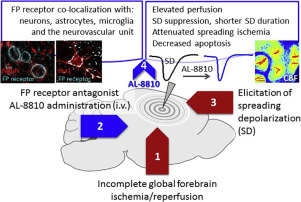当前位置:
X-MOL 学术
›
Neurobiol. Dis.
›
论文详情
Our official English website, www.x-mol.net, welcomes your feedback! (Note: you will need to create a separate account there.)
The antagonism of prostaglandin FP receptors inhibits the evolution of spreading depolarization in an experimental model of global forebrain ischemia.
Neurobiology of Disease ( IF 6.1 ) Pub Date : 2020-01-25 , DOI: 10.1016/j.nbd.2020.104780 Dániel P Varga 1 , Írisz Szabó 1 , Viktória É Varga 1 , Ákos Menhyárt 1 , Orsolya M Tóth 1 , Mihály Kozma 2 , Armand R Bálint 1 , István A Krizbai 3 , Ferenc Bari 1 , Eszter Farkas 1
Neurobiology of Disease ( IF 6.1 ) Pub Date : 2020-01-25 , DOI: 10.1016/j.nbd.2020.104780 Dániel P Varga 1 , Írisz Szabó 1 , Viktória É Varga 1 , Ákos Menhyárt 1 , Orsolya M Tóth 1 , Mihály Kozma 2 , Armand R Bálint 1 , István A Krizbai 3 , Ferenc Bari 1 , Eszter Farkas 1
Affiliation

|
Spontaneous, recurrent spreading depolarizations (SD) are increasingly more appreciated as a pathomechanism behind ischemic brain injuries. Although the prostaglandin F2α - FP receptor signaling pathway has been proposed to contribute to neurodegeneration, it has remained unexplored whether FP receptors are implicated in SD or the coupled cerebral blood flow (CBF) response. We set out here to test the hypothesis that FP receptor blockade may achieve neuroprotection by the inhibition of SD. Global forebrain ischemia/reperfusion was induced in anesthetized rats by the bilateral occlusion and later release of the common carotid arteries. An FP receptor antagonist (AL-8810; 1 mg/bwkg) or its vehicle were administered via the femoral vein 10 min later. Two open craniotomies on the right parietal bone served the elicitation of SD with 1 M KCl, and the acquisition of local field potential. CBF was monitored with laser speckle contrast imaging over the thinned parietal bone. Apoptosis and microglia activation, as well as FP receptor localization were evaluated with immunohistochemistry. The data demonstrate that the antagonism of FP receptors suppressed SD in the ischemic rat cerebral cortex and reduced the duration of recurrent SDs by facilitating repolarization. In parallel, FP receptor antagonism improved perfusion in the ischemic cerebral cortex, and attenuated hypoemic CBF responses associated with SD. Further, FP receptor antagonism appeared to restrain apoptotic cell death related to SD recurrence. In summary, the antagonism of FP receptors (located at the neuro-vascular unit, neurons, astrocytes and microglia) emerges as a promising approach to inhibit the evolution of SDs in cerebral ischemia.
中文翻译:

在全球前脑缺血的实验模型中,前列腺素FP受体的拮抗作用抑制了扩展去极化的发展。
自发性,复发性扩展去极化(SD)作为缺血性脑损伤背后的致病机制越来越受到人们的重视。尽管已提出前列腺素F2α-FP受体信号传导途径可导致神经退行性变,但是否FP受体参与SD或脑血流耦合(CBF)反应尚待探讨。我们在这里开始测试以下假设:FP受体阻滞剂可能通过抑制SD来实现神经保护。通过双侧闭塞和随后颈总动脉的释放,在麻醉的大鼠中诱发全脑前缺血/再灌注。FP受体拮抗剂(AL-8810; 1 mg / bwkg)或其媒介物在10分钟后通过股静脉给药。在右顶骨上进行两次开颅手术,以1 M KCl诱发SD,并获得当地的田间潜力。用激光斑点对比成像在变薄的顶骨上监测CBF。用免疫组织化学评估细胞凋亡和小胶质细胞活化以及FP受体定位。数据表明,FP受体的拮抗作用通过促进复极化作用抑制了缺血大鼠大脑皮层的SD,并减少了SD复发的持续时间。同时,FP受体拮抗作用可改善缺血性大脑皮层的灌注,并减弱与SD相关的低血性CBF反应。此外,FP受体拮抗作用似乎可以抑制与SD复发相关的凋亡细胞死亡。总之,FP受体的拮抗作用(位于神经血管单元,神经元,
更新日期:2020-01-26
中文翻译:

在全球前脑缺血的实验模型中,前列腺素FP受体的拮抗作用抑制了扩展去极化的发展。
自发性,复发性扩展去极化(SD)作为缺血性脑损伤背后的致病机制越来越受到人们的重视。尽管已提出前列腺素F2α-FP受体信号传导途径可导致神经退行性变,但是否FP受体参与SD或脑血流耦合(CBF)反应尚待探讨。我们在这里开始测试以下假设:FP受体阻滞剂可能通过抑制SD来实现神经保护。通过双侧闭塞和随后颈总动脉的释放,在麻醉的大鼠中诱发全脑前缺血/再灌注。FP受体拮抗剂(AL-8810; 1 mg / bwkg)或其媒介物在10分钟后通过股静脉给药。在右顶骨上进行两次开颅手术,以1 M KCl诱发SD,并获得当地的田间潜力。用激光斑点对比成像在变薄的顶骨上监测CBF。用免疫组织化学评估细胞凋亡和小胶质细胞活化以及FP受体定位。数据表明,FP受体的拮抗作用通过促进复极化作用抑制了缺血大鼠大脑皮层的SD,并减少了SD复发的持续时间。同时,FP受体拮抗作用可改善缺血性大脑皮层的灌注,并减弱与SD相关的低血性CBF反应。此外,FP受体拮抗作用似乎可以抑制与SD复发相关的凋亡细胞死亡。总之,FP受体的拮抗作用(位于神经血管单元,神经元,


























 京公网安备 11010802027423号
京公网安备 11010802027423号